- Clone
- P2B1 (See other available formats)
- Regulatory Status
- RUO
- Other Names
- Platelet endothelial cell adhesion molecule, PECA1, GPIIA', endoCAM, CD31 antigen, CD31/EndoCAM, adhesion molecule, PECAM-1, CD31/EndoCAM
- Isotype
- Mouse IgG1, κ
- Ave. Rating
- Submit a Review
- Product Citations
- publications
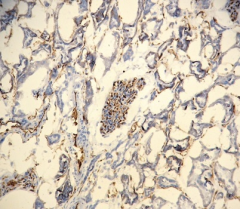
-

IHC staining of clone P2B1 on frozen human kidney tissue. The primary antibody was incubated at 1 µg/ml for 60 minutes at room temperature. BioLegend’s Ultra-Streptavidin (USA) HRP Kit (Multi-Species) was used for detection according to the protocol provided. -

Immunofluorescence of HUVEC cells with (A) mouse IgG1, κ isotype control (Negative, Cat. No. 401402) or (B-D) CD31 antibody (Clone P2B1). Alexa Fluor® 488 (Green) Goat anti-Mouse IgG (Cat. No. 405319) was used as secondary antibody. Nuclei were counterstained with DAPI (Blue, Cat. No. 422801). The image was captured with a 60X objective using KEYENCE BZ-X700 fluorescence microscope. Exposure time (Seconds) for (A) is 1/15, and (B-D) is 1/50. Concentrations for (A, B) is 2 µg/ml, (C) is 1 µg/ml and (D) is 0.5 µg/ml.
| Cat # | Size | Price | Quantity Check Availability | Save | ||
|---|---|---|---|---|---|---|
| 910005 | 100 µg | $253 | ||||
CD31, also known as platelet endothelial cell adhesion molecule-1 (PECAM-1) or Endocam, is a 130-140 kD type I transmembrane glycoprotein. It is expressed on monocytes, platelets, granulocytes, endothelial cells, and lymphocyte subsets. In inflammatory situations, CD31 has been reported to bind CD38 and is involved in wound healing, angiogenesis, and cellular migration.
Product DetailsProduct Details
- Verified Reactivity
- Human
- Antibody Type
- Monoclonal
- Host Species
- Mouse
- Immunogen
- The P2B1 monoclonal antibody was generated against IL-1β activated human umbilical vein endothelial cells (HUVECs).
- Formulation
- Phosphate-buffered solution, pH 7.2, containing 0.09% sodium azide.
- Preparation
- The antibody was purified by affinity chromatography.
- Concentration
- 0.5 mg/ml
- Storage & Handling
- The antibody solution should be stored undiluted between 2°C and 8°C.
- Application
-
IHC-F - Quality tested
ICC - Verified - Recommended Usage
-
Each lot of this antibody is quality control tested by immunohistochemistry on frozen tissue sections. For immunohistochemistry, a concentration range of 0.5 - 5.0 μg/ml is recommended. For immunocytochemistry, a concentration range of 1.0 - 2.0 μg/ml (1:250 - 1:500 dilution) is recommended. It is recommended that the reagent be titrated for optimal performance for each application.
- Application Notes
-
Additional reported applications (for the relevant formats) include: immunofluorescent staining1.
Predicted Molecular Weight = 83 kD -
Application References
(PubMed link indicates BioLegend citation) -
- Brooks PC, et al. 1995. J. Clin. Invest. 96(4):1815. (IF)
- RRID
-
AB_2566676 (BioLegend Cat. No. 910005)
Antigen Details
- Structure
- 130-140 kD type I transmembrane glycoprotein belonging to the Ig superfamily.
- Distribution
-
Found on the surface of platelets, monocytes, neutrophils, and some types of T-cells. Makes up a large portion of endothelial cell intercellular junctions.
- Function
- Cell adhesion molecule which is required for leukocyte transendothelial migration under most inflammatory conditions. Induces susceptibility to atherosclerosis, member of the immunoglobulin superfamily and is involved in leukocyte migration, angiogenesis, and integrin activation.
- Ligand/Receptor
- CD38
- Cell Type
- Platelets, Monocytes, Neutrophils, T cells
- Biology Area
- Cell Biology, Cell Motility/Cytoskeleton/Structure, Neuroinflammation, Neuroscience, Signal Transduction, Synaptic Biology, Transcription Factors
- Molecular Family
- Adhesion Molecules, CD Molecules
- Antigen References
-
1. Tang DG, et al. 1993. J. Biol. Chem. 268(30):22883.
2. Wenzel K, et al. 1999. Hum. Mutat. 14(6):545. - Gene ID
- 5175 View all products for this Gene ID
- UniProt
- View information about CD31 on UniProt.org
Other Formats
View All CD31 (PECAM-1) Reagents Request Custom Conjugation| Description | Clone | Applications |
|---|---|---|
| Anti-CD31 (PECAM-1) | P2B1 | IHC-F,ICC,WB,IP |
| Purified anti-CD31 (PECAM-1) | P2B1 | IHC-F,ICC |
Compare Data Across All Formats
This data display is provided for general comparisons between formats.
Your actual data may vary due to variations in samples, target cells, instruments and their settings, staining conditions, and other factors.
If you need assistance with selecting the best format contact our expert technical support team.
 Login/Register
Login/Register 




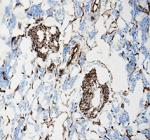
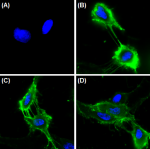
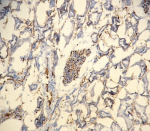
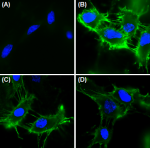



Follow Us